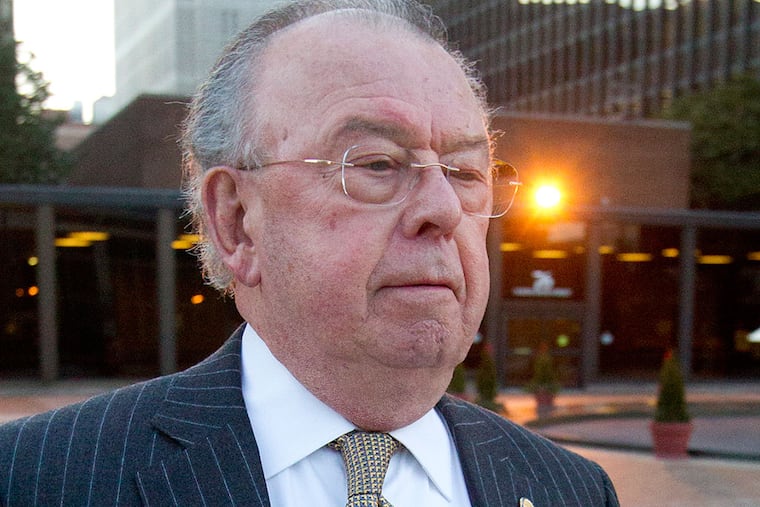Ironworkers' union boss, 73, gets 19 years in prison
Joseph Dougherty, once one of the city's most powerful labor leaders and an unapologetic enemy of nonunion builders, was sentenced Monday to 19 years and two months in federal prison for overseeing a years-long campaign of sabotage, arson, and intimidation to keep members of his Ironworkers Local 401 employed.

Joseph Dougherty, once one of the city's most powerful labor leaders and an unapologetic enemy of nonunion builders, was sentenced Monday to 19 years and two months in federal prison for overseeing a years-long campaign of sabotage, arson, and intimidation to keep members of his Ironworkers Local 401 employed.
The sentence - the stiffest in a racketeering conspiracy case that led to convictions of 11 other ironworkers - was hailed as a significant victory in a city where contractors have long complained of the violent tactics employed by some construction unions.
Comparing Dougherty to Lady Macbeth, U.S. District Judge Michael Baylson chastised the 73-year-old business manager for acting behind the scenes and relying on "an army of ironworkers" to commit crimes for him.
"That's the real tragedy of this case," Baylson said. "His leadership led to a lot of damage. It led to a lot of crimes. It continued the bad reputation Philadelphia has for tolerating union violence."
Despite his crimes, it was clear Monday that Dougherty - who led his union from the late 1990s through his arrest last year - still enjoyed widespread support in the city's labor community.
About 200 ironworkers and supporters rallied outside the courthouse before his hearing, chanting, "Free Joe Doc."
Notable in their absence, however, were prominent labor leaders including the heads of the Philadelphia AFL-CIO and the Philadelphia Building Trades Council.
Inside the courtroom, a gallery packed with family and union members applauded Dougherty as he was led before the judge in handcuffs. Even after Baylson handed down what will almost certainly become a life sentence, supporters yelled, "It ain't over yet, Doc!"
Joe Mathis, a 60-year-old ironworker from Roxborough, said he still could not believe the union leader that he knew had committed the crimes of which he was convicted in January.
"I think he was trying to put a stop to it," Mathis said, crediting what he described as Dougherty's strategy of winning work for his members by outperforming nonunion workers.
Dougherty remained silent when given his chance to address the judge - a far cry from the tough-talking, foulmouthed union boss who emerged in dozens of FBI recordings played throughout his trial.
Speaking to his union subordinates, Dougherty repeatedly referred to nonunion contractors as "subhuman" and "pigs."
"You should be able to do whatever you want to them, and it should be legal," he said on one recording. "There shouldn't be a crime."
Still, argued Dougherty lawyer Mark Cedrone, there was no proof that his client ordered - or even knew about - many of the attacks union members carried out on construction sites across the region.
That list included some of the most high-profile incidents in the city's recent history, such as the 2012 arson of a Quaker meetinghouse in Chestnut Hill, the baseball-bat beatings of nonunion workers outside a King of Prussia Toys R Us in 2010, and an all-out brawl in 2013 between ironworkers and members of the Carpenters union.
"Mr. Dougherty did not actively participate in any of these crimes," Cedrone said.
But that misses the point, said Assistant U.S. Attorney Robert J. Livermore. Under Dougherty, the use of violence as a negotiating tactic became deeply ingrained in the union.
Members rose through the ranks by participating in goon squads that struck back at contractors who refused to hire their union ironworkers. One group openly referred to itself as "the Helpful Union Guys" - "T.H.U.G.S." for short.
While Dougherty may not have participated in or ordered all of attacks, Livermore said, he rewarded his union's saboteurs with plum job assignments and his support for elected union posts.
"There's no question who was the boss, who set the tone of the organization, and who was responsible for the arsons in that case," Livermore said. "Mr. Dougherty earned that sentence based on his actions and based on what he created."
Baylson acknowledged Dougherty's age and failing health. He has recently suffered a heart attack and a stroke, and was hospitalized with breathing problems during his trial. Should he serve out his term, he would be 92 upon his release.
But ultimately, even the 19-year sentence he received fell about three years short of the term suggested by federal sentencing guidelines. Dougherty faced a mandatory minimum sentence of 15 years.
In addition to his prison term, Dougherty was ordered to contribute to the $558,000 the convicted union members owe in restitution.
That punishment should be more than enough to send a message, U.S. Attorney Zane David Memeger said.
"The sentence in this case serves as a reminder that corrupt union practices and bullying tactics, like those employed in this case, will be met with severe consequences," he said. "Fear, intimidation, and violence should not be a part of any union's operational handbook and will not be tolerated in this district."